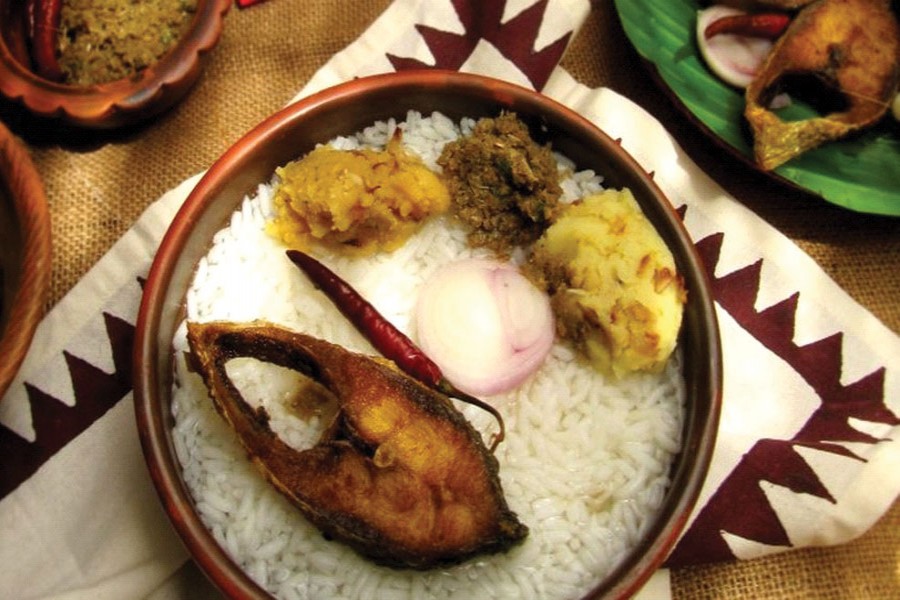
Published :
Updated :

It's again time to leave the past behind and welcome the future. Pahela Baishakh is to celebrate the start of a new Bangla year with fresh hopes. The day bears testament to our history of diversity. It's a celebration that unites our people in cultural harmony. It is one of the most joyous moments of the year, when we all get together with our friends, family members and relatives to see off the bygone year and welcome the incoming one. Some toddlers will be saying hello to Pahela Baishakh for the first time in his or her life.
It's a jubilant occasion for all regardless of religion and status that brings the entire country together in celebrations and festivities. It's an occasion admired with new aspirations and vivacity. Food is a big part and what better way to begin New Bangla Year than with some lip-smacking delicacies like fried hilsha fish. It's a day when one experiences a trip of nostalgia.
It is also a poignant day when one will be saying farewell not only to the passing year, but to a lot of things. Some of your known faces must have faded away in the past year. One of them was perhaps a lover you just couldn't hold onto any more. Maybe your loved one went away to a world much more beautiful then here.
Things have changed since the time decades ago when Nobo Borsho or Halkhata was celebrated with a down-to-earth view. The festival was modest and yet elegant. We used to wear new dresses and visit relatives to have fun. Parents were busy cleaning houses the day before. The main attraction was to visit shops to relish sweetmeats. The shopkeeper was busy meeting clients who thronged to clear their dues. It was a day to visit fairs. It was an occasion to watch games and circus. It was a date to strengthen bonds and make a change for the better. It was a day to make new resolutions. Resolutions to give up smoking, to forget the lost love, to do more exercise, to become more organised or to laugh more. I don't remember eating panta with hilsha. Neither did I see a procession called Mangal Shobhajatra.
It is heartening to note that National Board of Revenue (NBR) is organising Halkhata Day on the next working day following Pahela Baishakh and considering incentives for the taxpayers if they pay their dues on that day. It is a good move indeed when the NBR is struggling against tax defaulters to realise Tk 500 billion. Drawing a balance sheet of the by-gone year and distributing sweetmeats and gifts to good taxpayers could be an example for the banks to follow suit when the banking industry is sucking the whole economy into a 'black hole'.
The Mangal Shobhajatra this year will feature various animal-shaped carnival floats, large colourful masks, replicas of birds, butterflies, traditional dolls and other motifs. Students of the Fine Arts Department of Jatiya Kabi Kazi Nazrul Islam University (JKKNIU) are organising Pahela Baishakh celebrations with Mangal Shobhajatra as their central theme. They will bring some variations in their traditional items this time focusing on images of owls, horses, sampan, tepa putul, palki and the national bird, doel (magpie robin).
When you catch a whiff of belly flowers in a rain-soaked evening, an air of melancholy surrounds you. When on a sultry day, a sudden cool breeze chills your body, you miss your loved one. When buoyant air rises high above in the sky to form dark clouds unleashing a nor'wester thunderstorm in the afternoon on the first day of the first month of Bangla Year, you are not just celebrating Pahela Baishakh to welcome a New Year, your soul cries out to revisit such a day in your yesteryears long ago when you were young. On this day, love was on the horizon. It was perhaps a day of your first date with your first love. Maybe, a day when your love just vanished into the thin air. It was, most likely, a golden day of your marriage. It is a day when the intensity of your feelings ends up mesmerising you. You feel the urge to dive in and. start professing your undying love. You feel moody. Whatever our memories or feelings, on Pahela Baishakh, we savour the signature song Aarti Mukherji so passionately sang:
GK ˆekv‡L †`Lv nj `yRbvi, Rwô‡Z nj cwiPq| Avm‡Q Avlvp gvm, gb ZvB fve‡Q, wK nq wK nq! (We met on a day in Baishakh (the first month of Bangla New Year). Got a bit closer in Jaishtha (the second month). Monsoon is approaching and my heart is throbbing in uncertainty. Don't know what awaits my fate!)
Words of the last year were in the yesteryear's language and words of the New Year will be pronounced in new voices. Paraphrasing Rabindranath Tagore let us sing in a chorus: "Let old memories fade away. Let us not remember the forgotten melodies. Let our tears evaporate into the distant skies. Let us wipe away our weariness. Let the Earth take a sunbath to reappear as a sacred planet."
May this Pahela Baishakh be the sweetest one we've ever made and one we never forget!


 For all latest news, follow The Financial Express Google News channel.
For all latest news, follow The Financial Express Google News channel.